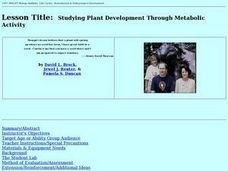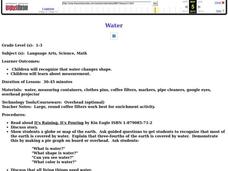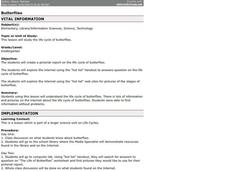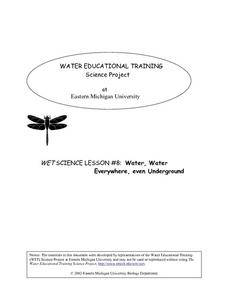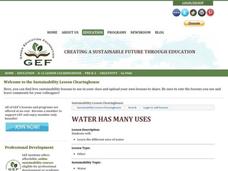Curated OER
Studying Plant Development Through Metabolic Activity
A hands-on activity which allows young scholars to learn about cellular respiration. This lesson contains a range of investigations testing the rates of cellular respiration to demonstrate the relationship between metabolic rates of...
Curated OER
Forest Floor Terrarium
Students study the aspects of a forest floor ecosystem, including decomposition, the water cycle, food webs, the needs of living things, and physical vs. chemical change over an extended period. In addition, students conduct observations...
Curated OER
Plant Life for Kids
In these plant life worksheets, students complete a worksheet about parts of a plant, plant life, plant life cycle sequence, and then complete a plant life mini book.
Curated OER
Water 1: Water and Ice
Students explore forms that water can take. In this science instructional activity, students participate in hands-on activities that require them to change water to a solid and back to a liquid again.
Curated OER
Water
Students complete activities to examine the properties of water. In this water science lesson, students read a book about water's forms and study a map or globe of the Earth to investigate water. Students discuss living things that need...
Curated OER
Journey of a Raindrop to the Chesapeake Bay
Students explore the water cycle and the path a single drop of water would take if it traveled from their schoolyard to the Chesapeake Bay in Virginia.
Curated OER
Race the Track! Design Challenge
Students use the design process to investigate physical science. For this force and motion lesson, design a track to achieve a specified outcome. Students complete additional experiments with speed and distance. Students...
Curated OER
Race the Track! The Time Challenge (lesson 2)
Students design a track that keeps a ball in motion for 5 seconds or longer. In this designing lesson plan, students explore force, gravity, and cause and effect when it comes to science and building before building their own track.
Curated OER
Sky Time: On the Astronomical Meaning of the Day, Year and Seasons
Young scholars simulate the movement of the Earth using their body motion. In this earth science lesson, students explain how this causes seasonal changes on Earth.
Alabama Learning Exchange
The Earth Has Many Layers
Students conduct an experiment. In this Earth's layers lesson, students learn about soil, sand and rock. They complete their own Jell-O Mountain and investigate the Earth's layers on-line.
Curated OER
How Are Polymers Utilized in Everyday Life?
Students investigate polymers and their uses in everyday life. In this polymers instructional activity, students are assigned one of the 10 areas of polymer science and they do research on their assigned area using the internet. Students...
Curated OER
The Magic School Bus Goes to Seed
Learners learn along with Ms. Frizzle's class. In this Magic School Bus lesson plan, students get a bugs-eye view of the flower world and find out how seeds are created, how they travel, and how they grow into plants.
Curated OER
Butterflies
Students study and create a pictorial report on the life cycle of butterflies. They explore the internet using the "hot list" handout to answers question on the life cycle of butterflies. They present their pictorial reports to the rest...
Curated OER
Birth of a Butterfly
Young scholars demonstrate an understanding of insects and science as a whole and construct the life cycle of a butterfly using pasta. They first fold a piece of paper into four equal parts. In the upper left corner will be stage one...
Curated OER
Aquatic Insects: Water Quality Index & Diversity Index
Students search stream beds to study the life cycle and adaptations of stream insects. They explore creeks and streams to see the diversity index of creeks or streams and to find the water qualit index.
Curated OER
Water, Water Everywhere, Even Underground
The "Engage" section of a wetlands lesson plan asks young ecologists to examine a wetlands poster. You can easily find one online and display it using a projector. Pupils immerse a piece of sandstone and a piece of granite in water to...
Curated OER
Birth, Growth, And Development
Students understand that all living things have a life cycle that includes being born, developing into an adult, reproducing, and eventually dying.
Curated OER
Introduction To Brine Shrimp
Fourth graders engage in a variety of activities in order to find information about the brine shrimp. The lesson includes background information for the teacher to deliver instruction. They make observations of the shrimp in different...
National Park Service
It's Not Easy Being Grizz
Grizzly bears can be up to 600 pounds and require a great deal of food, especially to survive hibernation. Comprised of multiple games, the third lesson of five only uses one setup. Pupils run around a large field, sorting and collecting...
Curated OER
Water Around Us
Students create a collage of human land use activities around a body of water. Students evaluate the effects of different kinds of land use on wetland habitats, and create a list of pros and cons for each land use.
Curated OER
Water Has Many Uses
Students discover numerous uses of water. In this water usage lesson, students interview family members and discover unknown ways water is used in our daily lives. Numerous resources are provided.
Curated OER
Is the Moon out tonight?
Learners talk or read about the way the moon travels across the sky. They then look at the picture of where the moon is and draw where it will be in the picture, later in the evening. Note: The worksheet is intended for third or fourth...
Curated OER
Lunar Real Estate
Students investigate the aspect of colonizing the moon by comparing techniques that are used on Earth. The colonization takes place with the planning of a hypothetical model. The model is used as a point of discussion and target...
Curated OER
Lunar Myths
Fourth graders explore the phases of the moon. In this moon lesson, 4th graders research myths regarding the moon and create a PowerPoint presentation to share their findings.
